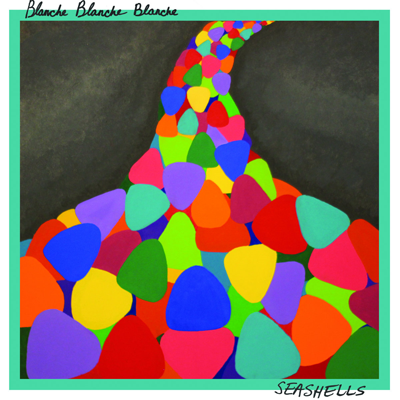To properly cover what makes Seashells such a special album, I first need to enumerate the things that aren’t new about it.
Seashells is not the first album by the formerly-Vermont-based currently-New-York-based two piece pop outfit Blanche Blanche Blanche. It is, however, the first album the duo had released in six years, preceded by their 2014 record Hints to Pilgrims. Blanche Blanche Blanche is the joint effort of Zach Phillips and Sarah Smith. Sarah does the words and Zach does the backing. Several of Blanche Blanche Blanche’s albums were released through Zach’s own label OSR Tapes. OSR closed in 2017, between the release of Hints to Pilgrims and Seashells.
Smith’s musical output (from what I understand) doesn’t extend beyond her collaborations with Phillips. Phillips is involved in a number of other groups, most notably the recent mediumband chanson powergroup Fievel Is Glauque. Phillips is also a frequent contributor to Tori Kudo’s chamber caravan Maher Shalal Hash Baz, and has accumulated a formidable solo discography in his own right. Phillips has released at least one solo tape/album/whatever per year since 2008. This is to say that Blanche Blanche Blanche’s sudden absence did not coincided with a broader pause in Phillips’ output. Blanche Blanche Blanche never disbanded, it hibernated.
Seashells is not a token reunion record, or at least it doesn’t seem like it is. Seashells’ release was followed by a (mostly acoustic) companion EP, Food For Thought, released through Feeding Tube Records a few months later. Additionally, Blanche Blanche Blanche have announced that their 11th mainline record, Fiscal, Remote, Distilled, was released through Phillips’ new label la Loi on March 1st of this year. That record consists mostly of new arrangements of old tracks meant to accommodate a six-piece live setup. *Seashells* is the start of a new era, not a bookend.
(Fiscal, Remote, Distilled is not the first record Blanche Blanche Blanche has released of revised versions of older material. Breaking Mirrors, Blanche Blanche Blanche’s 8th official album, christened a ridiculous three guitar lineup that Blanche Blanche Blanche toured with towards the latter half of 2013. Most of its runtime consists of new compositions, though it contains several modified versions of tunes from Wooden Ball, which was released six months earlier.)
Seashells is not a clean break, nor is it a soft reboot of the Blanche saga. Some characters from what could be called Blanche Blanche Blanche’s lore make their triumphant return on this record including Wooden Ball’s simple child and Wink With Both Eyes’ Jason.
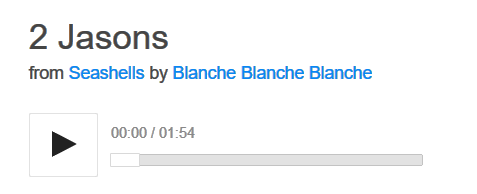
Two of them.
Seashells is not the first Blanche Blanche Blanche album that reads as a series of vignettes more than finished songs, though it is the first time this songwriting style has made their work feel so claustrophobic. Blanche Blanche Blanche’s early discography consists entirely of intentionally written pop music. 2012’s Wink With Both Eyes contains a number of the finest verse-chorus-verse-chorus-brige-chorus tunes ever released.
Phillips’ interest in the rapid fire songwriting style that’s characterized Blanche Blanche Blanche’s last few full length records crystalized in 2013 with the release of his solo Recorded in Heaven/Hell diptych. These tunes are not premeditated. From what I can tell, these songs were written during the session in which they were recorded. They’re more indebted to the recording process itself than any period of writing.
Phillips’ concurrent impressionistic solo efforts had a definite impact on Hints to Pilgrims, the last record of Blanche Blanche Blanche’s first season. That record’s chords meander in wild directions, but they always find their way back towards an immensely cathartic chorus. Smith’s vocals are a lovely monochromatic shade. Their close harmonies nimbly surf atop the record’s instrumentals. These compositions are sparse and dramatic, but they’re still designed to conclude in a satisfying manner. Hints to Pilgrims is ultimately a light, enjoyable listen despite its complexity.
Seashells, on the other hand, is anything but breezy. Seashells isn’t so keen on resolving most of the monstrous chord progressions it veers into. Strange fistfulls of notes preface other strange fistfulls of notes. It’s jazzy, but more than that it’s mechanical. These chords land on the downbeat. They never don’t land on the downbeat. They’re each immense centers of gravity into which Seashells’ spastic ornamentation gets sucked in.
The monotone cadence Smith honed in on during Hints to Pilgrims session is back, and it’s been brought to the forefront. That’s not just a matter of her voice being higher up in the mix than it was on Hints for Pilgrims, either. In fact, it’s hard to find a point on Seashells where Smith isn’t saying something. Between her lines, Smith has taken to ad libbing. Seashells is littered with split second nonsense phrases.
The number can’t be lower than five
(Hold up)
And it can’t be more than three
(More than three)
It would take two of a kind to change my mind
(Mind)
Roll the nice dice twice with me
(Woah)
Some of these sayings recur throughout Seashells. Towards the end, it’s hard to tell whether or not a song is truly over until Smith clarifies that she is peacing out. The most confounding one to me is whenever she title drops the album DJ Drama style. “Seashells!” To be clear, this is a good thing. It’s never not funny. However, it does also mean that chances to breathe are few and far to come by on Seashells. It’s an obtuse, bewildering album, one that sounds like it’s been broken apart and hastily reassembled dozens of times.
Seashells is not the headiest record that Blanche Blanche Blanche has released. That title goes to Papa’s Proof. That record, however, is challenging entirely due to its internal mechanisms. Papa’s Proof is aesthetically unified with the records that were released before and after it. It does not pack the 1-2 punch of being a challenging and anomalous in the way that Seashells does. Papa’s Proof is also keen to share its secrets. Odd beats, like the asynchronous guitar solo in “Me Quentin”’s bridge, feel fundamental after a few listens. It’s strict but charitable. Most importantly, the experience feels manufactured. Navigating Papa’s Proof feels like working through a well designed puzzle. Each labyrinthine twist builds on previous ideas in a meaningful way. Like most good video games, Papa’s Proof only has one difficulty setting.
Seashells, inversely, is monolithic. Recall that these tracks were made “in short sessions.” This does not diminish Seashells’ value as a body of work, but it does mean that each second of Seashells was agonized over less than every second of Papa’s Proof, and that difference is absolutely audible in the final product. Seashells is playing with its hand up. I’ve prodded this thing for a while now and it hasn’t budged an inch. It’s designed in the sense that it has a design, as in how a piece of paper attains a designed when it is crumpled and unfolded again.

Seashells is not the first Blanche Blanche Blanche record to prominently feature synthesized instruments. This does not make it any less weird that most of the record was performed with presets on keyboards. Blanche Blanche Blanche’s debut, Songs Of Blanche Blanche Blanche, is comprised entirely of synthesizers and vocals. However, from that point of departure up until their hiatus, the duo slowly moved away from synthesizers and towards acoustic instrumentation. I’d go as far as to call this the main aesthetic art of Blanche Blanche Blanche’s first run, with Hints to Pilgrims, an album constructed mostly out of piano, bass guitar, and vocals, serving as a perfect finale.
Blanche Blanche Blanche’s always been good at setting a tone in their opening moments. The first seconds of every record by these guys are drilled deep into my subconscious. With this in mind, it is completely befuddling that the very first sound Seashells presents to its audience is the preset drumroll you found with while fucking around on your middle school’s keyboards while you were bored in music class. The opener, “Gangstalker,” doesn’t relent there, though. That bridge is a lot to handle even having heard it a dozen or so times. Those fucking horns dude. It sounds like something else that sounds like a shitpost, but it’s too biting to be nonsense.
Is this mine? Send it back
Seashells is not the first Blanche Blanche Blanche record to reference the outside world. Wooden Ball has a tongue-in-cheek paranoiac streak to it that feels simultaneously critical of and indebted to the myriad regional punk sub-subcultures of the late 80’s.
You think this war is your animal friend
So you’re taking funny pictures of your own misguided hand
(That doesn’t make you
TEEEEEED Taaaaaalks
It’s not the biggest leap in the world, then, for 2021’s Seashells to include a song titled “Blocked And Reported.” Like, it’s weird, Seashells is more online than anyone in 2014 would be able to reasonably predict, but there’s precedent for it within their own body of work.
One thing that is strange about Seashells is how in depth some of these allusions to cyberspace go. Though it contains a more universal narrative about being pressured into sex, “Ask If You Can Ask” speaks truest to the experience of being pestered by a reply guy.
Ask if you can ask
(Come on get asking)
Ask if you can ask
(It’s not a crime, just ask)
May I blow your back out
(Please?)
May I get you a card for your birthday
(Just asking)
If I ask again
If I ask if I can ask again?
Even in its offline moments, Seashells approaches far sillier depths than the shallow glens of Wooden Ball’s straight-faced absurdity. Whereas Wooden Ball’s strangest moments are easy to engage with as pastiche, Seashells often sounds brazenly incorrect, aggressively unlike other things. It’s constantly daring me to take it seriously, throwing out a long string of fake punches.
I’m a monster, yeah, I’m a martyr now
Will the holy ghost I’ve never known not save me now?
(Yah)
Regardless of whether or not they connect, though, most of these punches do still make me flinch, and the ones that do connect hit like a truck. Seashells’ penultimate track, “Built to Last,” is sung in the same sardonic tone as the rest of the record, but it’s oddly bitter.
Wish things could be different, y’all
But it’s still on lockdown
Ain’t a damn thing changed with what’s to come
A family of one
When all will be revealed
It doesn’t matter how you feel
Oh goodness. Biblical violence. Smith’s talking about ruined lives here, apocalypse and ruin and all that. Her brevity suddenly twists into a cold indifference. We’re no longer laughing with her. She’s laughing at something over our shoulder. Then, just as quickly, she slips back into her normal mode. The album’s closer, “Heart Made of Rust,” the closer, is only remarkable in that it’s one of my favorite songs on the record. “Amen. Peace out.”
This all leads to the million dollar question: is this a pisstake? Am I being got? It’s not like these guys forgot how to write normal pop music. The first tape by Phillips’ aforementioned indie-lounge group Fievel is Glauque dropped the exact same day as Seashells, and that record’s one of the most pleasant things that’s come out this decade. Is this record’s emotional core only a product of me expecting it to have one in the first place? Is this the first part of the Blanche Blanche Blache ARG?
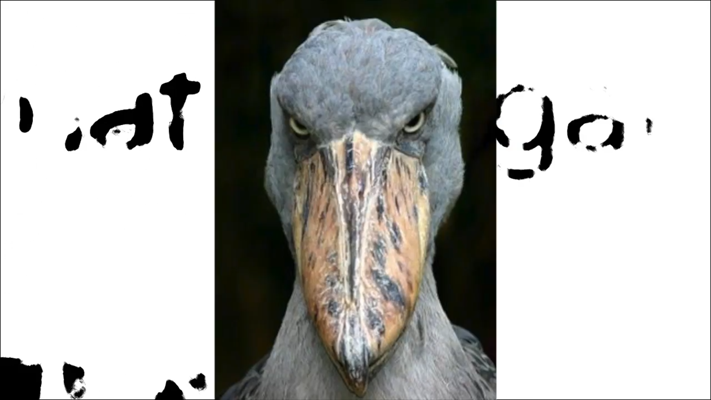
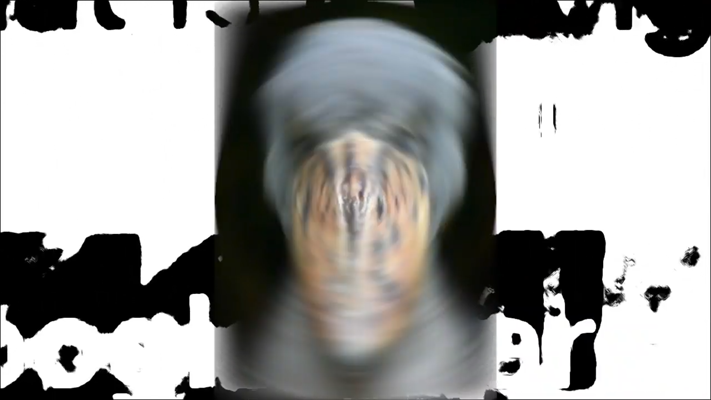
Blanche Blanche Blanche first found a home on labels adjacent to the 2010’s indie tape circuit, your Night Peoples and Feeding Tubes and the like. These labels released music as often as they released artifacts.
Though The Savage Young Taterbug, for example, is definitely a musician, their early output is easiest to read as a series of haunted cassette tapes. Their music is performed (and often written), but the resulting music is in service of making the tape, the physical object itself, sound a certain way. It’d be a formidable task to transcribe any of their music, as the means by which these chunks of audio were recorded are as much a part of the album as the instruments used to record it, or, for that matter, the rips of these recordings that pop up on youtube every once in a while. It’s music that gains its value from its indeterminate origin, music that sounds like music that is older than it is. It’s “hauntological” as the kids say.
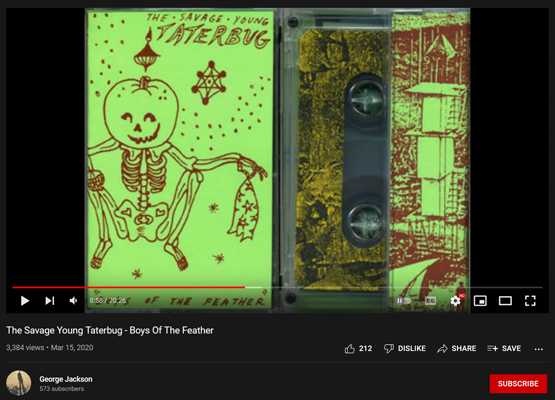
This poses a problem for Blanche Blanche Blanche, as at a surface level, their early output shares aesthetic similarities with this field of artifact music. Blanche Blanche Blanche’s first tape sounds old. Its lo-fi recording quality often makes Smith’s vocals difficult to discern. This is unfortunate, as these aesthetic tendencies are, in this instance, a byproduct of the way these songs were recorded. Songs of Blanche Blanche Blanche is a pop album ass pop album. Its songs were written. They can be transcribed and recorded again while containing their original essence. In fact, they have! Blanche Blanche Blanche’s most recent outing, the aforementioned Fiscal, Remote, Distilled, contains a new version of Songs of’s breakout hit “Talk Out Loud.” The new version of the decade old track sounds different (the Songs of version definitely doesn’t have sax licks), but it’s still the same song.
The Savage Young Taterbug could not rework most of the material from Boys Of The Feather with the same ease that Blanche Blanche Blanche is able to rework material from Wink With Both Eyes. This is not to say anything about the quality of The Savage Young Taterbug’s, or anyone else’s, music compared to Blanche Blanche Blanche. However, it is important that we never confuse these records for each other, as radically different critical lenses are necessary to get the most out of both of these projects. If you’re into that sort of thing Blanche Blanche Blanche’s music is successfully hauntological, as all of their music could’ve been composed and recorded at any time in the last 60 years, but it’s significantly more constructive to approach them as pop music. In this manner, Blanche Blanche Blanche is in limbo. They’re either a notable addition to the canon of 2010’s sludgedrone runoff music or the best currently active songwriting duo in America, but not both.
The 2010’s tape scene died off eventually. No pop music grew from its body. Pop music was the vase the scene was carrying when it crumpled over in a field. See its pieces scattered over the leaves. What grew from it was more artifacts, music about other music, music about thinking about pop music, vaporwave, Ariel Pink, etc. Blanche Blanche Blanche are not like Ariel Pink for the same reason they’re not like The Savage Young Taterbug, but Ariel Pink is not like The Savage Young Taterbug. I’m sure this all makes perfect sense, so I’m not going to elaborate on it further.
It’s fitting that Blanche Blanche Blanche chose to cease operations in 2014. It’s equally strange for a fairy circle to spring up around the place where the scene’s bones had long since returned to the soil in 2021. Is it a sign? It can’t be. The spiritual world died with a smirk on its lips along with the new age revival. Maybe, then, it’s a new pop album, one with good intentions and odd goals.
That’s the key. Seashells isn’t ironic, it’s silly. Nobody involved in the production of Wink With Both Eyes could ever make a pop album ironically. Seashells is the result of taking pop music as seriously as it could be taken. Even their forays into comedy never fall out of line with time honored punk and/or pop traditions of self parody. Though it may be jarring on a first listen, “Only For Men,” in all of its facetious virility and clownish instrumentation, is no less punk than Big Black’s rendition of Kraftwerk’s “The Model,” and that song was released on literally Touch And Go Records. It’s goofy, but more importantly, it’s cool and good.
I’m gonna barbecue you motherfuckers
Unless you suck me off
During that time between 2014 and 2019 when everyone else was spending their time growing disillusioned, Blanche Blanche Blanche were hibernating. So many hours were spent whittling away on artistic projects which would eventually collapse into meta-narratives about how worthless the artwork itself is in a broader cultural context, the artist’s self hatred migrating from subtext into text. After that long slumber, the unit woke to find their peers making goofy sounding pop music, and said “hey, that sounds neat!”
Seashells is Blanche Blanche Blanche’s Yeezus. Despite appearances, it’s never at risk of falling into a spiral of irony, post-irony, meta-irony, etcetera. Smith and Phillips care too much about pop music for that to have ever been in consideration. There’s no naivety involved, either. Seashells is bright and sincere. It’s disengaged. It has simply chosen not to participate.
Amen. Peace out. Blanche Blanche Blanche. Respect my webzone. I’ve never been toxic. Give it a try. Door Gallery. Jeepers creepers, y’all.
Listen: Bandcamp
